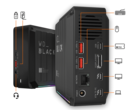Western Digital’s Ultrastar and Gold 16 TB and 18 TB drives are now more widely available. Previously, these capacity topping drives have only been accessible to hyperscale customers ordering tens of thousands of disks at a time (e.g. cloud storage solutions such as Dropbox). The new availability mostly affects smaller cloud and enterprise customers. Still, a notable inclusion on the list was system integrators, meaning these drives could start appearing in off-the-shelf NAS solutions.
These 16 TB and 18 TB drives utilise conventional magnetic recording (CMR) methods, therefore avoiding the performance penalty of shingled magnetic recording (SMR) drives during sustained write workloads. An SMR-based 20 TB Ultrastar HDD is expected within the next few months.
Sheer storage capacity and a comparatively affordable price are among the few advantages that traditional mechanical hard drives still have over solid-state drives. The highest capacities are often reserved for large data centres. For consumers, the largest drives currently cap out at 14 TB (WD + Toshiba) and 16 TB (Seagate) in NAS drives, or 6 TB (WD) and 14 TB (Seagate + Toshiba) in desktop drives.
I grew up in a family surrounded by technology, starting with my father loading up games for me on a Commodore 64, and later on a 486. In the late 90's and early 00's I started learning how to tinker with Windows, while also playing around with Linux distributions, both of which gave me an interest for learning how to make software do what you want it to do, and modifying settings that aren't normally user accessible. After this I started building my own computers, and tearing laptops apart, which gave me an insight into hardware and how it works in a complete system. Now keeping up with the latest in hardware and software news is a passion of mine.
> Expert Reviews and News on Laptops, Smartphones and Tech Innovations > News > News Archive > Newsarchive 2020 07 > Western Digital Ultrastar and Gold 16 TB and 18 TB drive availability spreads
Craig Ward, 2020-07-11 (Update: 2026-02-18)














